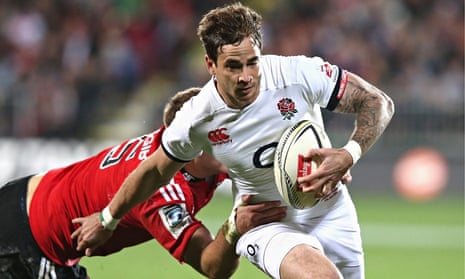And so it creeps another week closer, le Grand Départ, as they say in Yorkshire. On the first Friday of February the Six Nations launches with Wales-England at the Millennium Stadium in Cardiff and there will scarcely be a letup in international action – and certainly none in the department of international agonising – before the last Saturday in October, the day of the Rugby World Cup final at Twickenham. Any coach without a firm strategic grasp of what lies ahead and what his best team is may as well give up now. England squads, full and Saxon, will be announced on Wednesday.
Strangely enough, there is a little quirk in the calendar, a small insertion into the fixture list, that allows one last chance to tinker, to have a peep: Ireland Wolfhounds against England Saxons at Irish Independent Park (formerly and, without wishing to appear disrespectful towards one of Ireland’s grand old rags, more evocatively known as Musgrave Park) on 30 January. One last opportunity, perhaps, to see if there is not a little magic to sprinkle on the England style.
Actually, what it affords is a last chance to speculate before we are caught in the grip of reality. Of dealing with who is injured and who has dipped in form. The only (near) certainty is that Ben Morgan, the No8 who broke his leg while playing for Gloucester against Saracens, will be fit and raring to go in September. While his limb is encased, may we wish him a rest as pleasant as it can be for someone who makes his living by bowling people over.
Morgan’s absence does throw a little intrigue into these last few days of trying to second-guess the England coach. To replace him in the Six Nations, does Stuart Lancaster follow the guidelines of convention and go for an emerging player such as Dave Ewers (24) of Exeter, or does he exercise his right to push the button marked “exceptional circumstances”? There is a lot to be said for going for a more squat No8, such as Steffon Armitage, if England want to make yards from the base of the scrum. The Toulon forward is also almost impossible to shift once his clamp is tightened over the ball at the breakdown. But the name of the place where he plays his club rugby is the rub. Is the loss of Morgan a sufficiently exceptional circumstance to declare France in selection bounds?
Even more exotic would be to recall Nick Easter from an extreme exile of his own, the depths of age. The 36-year-old is, however, in the form of his life with Harlequins and has spoken of a burning desire to play for England again. This contrasts with the Easter who was presumed to be one of the old lags at the last World Cup who viewed a tenderfoot’s enthusiasm for anything like a weights session with disdain.
It would be good to see the old but new Easter on parade again, if only because judgment of him was perhaps based on what he did while obeying limited team orders. Now he might be encouraged to let his instincts guide him. In his golden twilight he might be inclined to give the passes for England, as he does for Harlequins, that might yet initiate less predictable routines. England are formidable but hardly full of surprises.
It’s a delicate business, trying to promote change. Billy Vunipola was dropped for Morgan halfway through England’s autumn series. There had been signs all season, both at Saracens and with England, of an attempt to broaden Billy’s skills, to make him more rounded, more like Kieran Read of New Zealand. The trouble is that Billy stopped doing the one thing he did better than Read: bash people out of his way. He stopped running on to the ball, his timing all shot. He couldn’t find the right angle, couldn’t lower himself into the right position for contact, couldn’t see an overlap. Billy looked coached to a standstill.
Sam Burgess has obviously had even more sessions to inculcate him with the strange ways of union but it seems the convert has absorbed just about every lesson and it is a shame he misses the match against Toulouse. Thrown at first into the arcane world of the back row, he looks much more at ease in the centre. If ever a second-tier Saxon fixture serves a purpose, surely it is to have a look at Burgess. And Danny Cipriani. Their 10-12 combination must be worth a flutter, mustn’t it?
The great problem is that the hastily assembled Saxons are not going to click immediately. The midfield will not be awash in perfectly delivered possession. Careers, either fledgling or resurrecting, tend to be dashed rather than made in Cork on Friday nights in late January.
Still, you never know. There is this late chance to shine, to catch the eye. Would it make a difference? England, Lancaster must know by now, are going to be what they are rather than what he might have hoped them to be when he took the job. It may yet be enough. Home advantage, home support, the simple power of home, as happened at the London Olympics, can inspire the hosts. That little sprinkle of unforeseeable something may arrive of its own accord, delivered by the England all around their team. It may be safer to speculate on that than muse on Burgess and Cipriani creating the surge that carries England to World Cup glory.

Comments (…)
Sign in or create your Guardian account to join the discussion